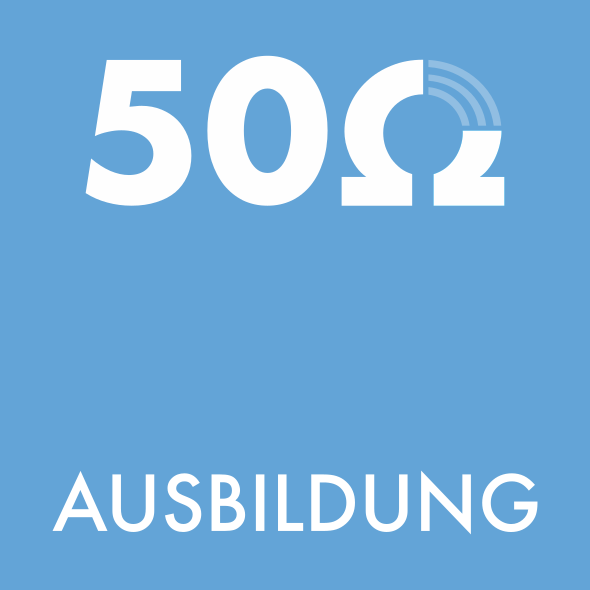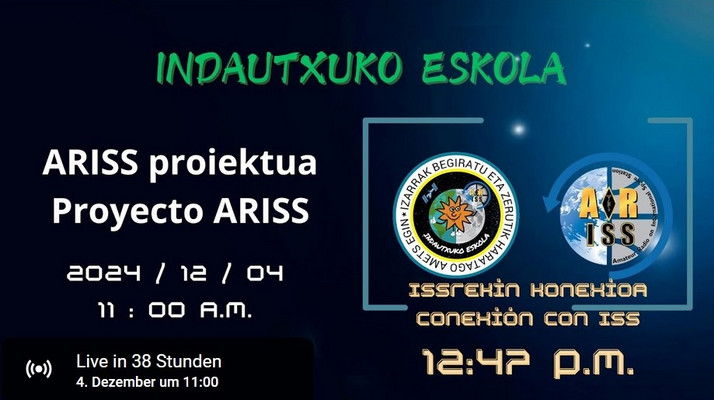December 2, 2024, Amateur Radio on the International Space Station (ARISS) has received schedule confirmation for an ARISS radio contact between an astronaut aboard the International Space Station (ISS) and students at CEIP INDAUTXUKO ESKOLA HLHI located in Bilbao, Spain. ARISS conducts 60-100 of these special amateur radio contacts each year between students around the globe and crew members with ham radio licenses aboard the ISS.
Indautxuko School, founded in 1918, is a Pre-Primary and Primary Education Centre (2-12 years old) located in Bilbao, in an urban environment with 625 students and 91 educational professionals. It is a multilingual school (Basque - Spanish co-official language, English and Spanish). The school is hosting this ARISS contact for their students in 5th and 6th grade (10-12 years old). Members of the Asociacion EuskoByte Elkartea amateur radio club (EA2RKE) are supporting the school for this event.
This will be a telebridge contact via Amateur Radio allowing students to ask their questions of astronaut Sunita Williams, amateur radio call sign KD5PLB. The downlink frequency for this contact is 145.800 MHz and may be heard by listeners that are within the ISS-footprint that also encompasses the telebridge station.
The ARISS amateur radio ground station (telebridge station) for this contact is in Aartselaar, Belgium. The amateur radio volunteer team at the ground station will use the callsign ON4ISS, to establish and maintain the ISS connection.
The ARISS radio contact is scheduled for December 4, 2024 at 12:47 pm CET (Bilbao, Spain) (11:47 UTC).
The public is invited to watch the live stream at: https://www.youtube.com/watch?v=vlwWxPnO6Ic
As time allows, students will ask these questions:
1. What studies should an astronaut have?
2. How do you feel inside the ISS?
3. How does the ISS move? Does anyone pilot it?
4. What project are you currently working on?
5. What physical and psychological characteristics should an ISS crew member have?
6. If you had an emergency, what would you do?
7. Are your routines always the same?
8. How do the Earth and the Moon look like from the ISS?
9. Would you be willing to travel to Mars?
10. What did you feel the first time you went into space?
11. How do you cook your food on the ISS?
12. How do you maintain hygiene?
13. Do you find sleeping in space comfortable?
14. How do you communicate with your families?
15. What do you do in your free time to avoid getting bored?
16. How do you know if you are face up or face down?
17. Do you get dizzy or sick in space?
18. Where does your toilet waste go?
19. Is space scary?
20. What have you brought to remember your family?
Media Contact:
Dave Jordan, AA4KN
ARISS PR
ARISS contact is scheduled with students at Publiczna Szkowa Podstawowa im. Walentego Stefanskiego w Bodzechowie, Bodzechow, Poland
December 4, 2024, Amateur Radio on the International Space Station (ARISS) has received schedule confirmation for an ARISS radio contact between an astronaut aboard the International Space Station (ISS) and students at the Publiczna Szkowa Podstawowa im. Walentego Stefanskiego w Bodzechowie, Bodzechow, Poland. ARISS conducts 60-100 of these special amateur radio contacts each year between students around the globe and crew members with ham radio licenses aboard the ISS.
This is a small public primary school in Bodzechow in the Owiotokrzyskie Province. It serves about 200 students who have been preparing for this ARISS contact by expanding their knowledge in the fields of astronautics and science, covering topics in physics, chemistry and mathematics. Students have also been motivated to learn English through numerous presentations, trips to participating institutions and organizations and thematic competitions. Students took part in workshops at the Copernicus Science Centre in Ostrowiec Owiotokrzyski, including one called SOWA. SOWA, which means 'owl' in Polish, is an acronym for the Discovery and Activity Zone, where students developed their creativity and gained knowledge through interactive experiences. They also visited the "Cosmopark" in the Czarnowska Gallery in Kielce - a unique space exhibition, including spacesuits, flight simulators, space plasma and a planetarium. During World Space Week at school, they took part in competitions, such as creating spaceship models and a Space fashion show. An additional attraction for the younger classes was the mobile planetarium "ORBITEK", where they learned about the history of space exploration and Earth's place in the Universe through special projections. Amateur radio activities at the school are supported by members of the Ostrowiecki Amateur Radio Club PZK (SP7POS) who have conducted workshops for students and teachers, presenting various aspects of amateur radio, including communication techniques with the space station.
This will be a direct contact via Amateur Radio allowing students to ask their questions of astronaut Sunita Williams, amateur radio call sign KD5PLB. The downlink frequency for this contact is 145.800 MHz and may be heard by listeners that are within the ISS-footprint that also encompasses the relay ground station.
The amateur radio ground station for this contact is in Bodzechow, Poland. Amateur radio operators using call sign SP7POS, will operate the ground station to establish and maintain the ISS connection.
The ARISS radio contact is scheduled for December 6, 2024 at 12:49 pm CET (Poland) (11:49 UTC).
The public is invited to watch the live stream at:
https://youtube.com/live/1Ch_r219Tvk
As time allows, students will ask these questions:
1. Do you think time passes faster or slower in space?
2. How much electricity does the ISS use each day?
3. Is the spacesuit comfortable?
4. What do you eat in space?
5. Which planet do you think is the most beautiful, apart from the Earth?
6. What do Saturn's rings look like up close?
7. What is life like for NASA astronauts who are staying on the ISS longer than planned?
8. Do you miss your family and friends?
9. Have you always wanted to be an astronaut?
10. What do astronauts do on the ISS?
11. What was your favourite subject in primary school?
12. Do you think humans will one day be able to land on Mars?
13. If you get sick in space, how do you deal with illness?
14. What is your favourite way to spend your free time on the ISS?
15. What is the most challenging part of being an astronaut?
16. What do you think about when you look at the Earth?
ARISS-Europe News Bulletins are distributed by AMSAT Belgium. You can help support this effort with a donation.
https://www.amsat-on.be/donation-ariss-europe-news-bulletin/
ARISS contact is ccheduled with ctudents at Christian Primary School Daniel, Warsaw, Poland
December 7, 2024, Amateur Radio on the International Space Station (ARISS) has received schedule confirmation for an ARISS radio contact between an astronaut aboard the International Space Station (ISS) and students at the Christian Primary School Daniel located in Warsaw, Poland. ARISS conducts 60-100 of these special amateur radio contacts each year between students around the globe and crew members with ham radio licenses aboard the ISS.
Christian Primary School Daniel in Warsaw is an educational institution founded by teachers of various Christian denominations. In grades 1-3, students are taught using the Montessori method, with emphasis on a Space-inspired approach. Students participate in language education and computer science, learn Python programming in the fifth grade and utilize modern technologies such as 3D printers and drones. Prior to this ARISS contact, students have been participating in lessons using Photon robot, EarthKam, "Observing with NASA" and learning about methods used in eduScrum projects, and CS Unplugged. Students also took part in workshops with BioCEN Laboratories (former Science Festival School), Astrobase in Dobrzy nad Wis (one of fourteen school astronomical observatories), Teatr Go (in cooperation with S. Kaliski Institute of Plasma and Laser Microfusion), and Copernicus Science Center. Remote lessons with experts were also organized as part of the ESERO Poland initiative "Lessons out of this world" and met with a potential future Polish astronaut. Members of the Amateur Radio Club of Warsaw (SP5POT) are supporting this ARISS contact and have enabled students to learn the fundamentals of radio communication, and enhance their technical interests and skills in amateur radio.
This will be a direct contact via Amateur Radio allowing students to ask their questions of astronaut Don Pettit, amateur radio call sign KD5MDT. The downlink frequency for this contact is 145.800 MHz and may be heard by listeners that are within the ISS-footprint that also encompasses the relay ground station.
The amateur radio ground station for this contact is in Warszawa, Poland. Amateur radio operators using call sign SP5POT, will operate the ground station to establish and maintain the ISS connection.
The ARISS radio contact is scheduled for December 9, 2024 at 12:03 pm CEST (Poland) (11:03:48 UTC).
The public is invited to watch the live stream at:
https://www.facebook.com/share/45Mq4px6R9Fnt6tK/
and
https://www.youtube.com/live/CDMgY2x5Kwo
As time allows, students will ask these questions:
1. How do you feel the temperature and air pressure inside the ISS?
2. How does microgravity affect your bones?
3. How do you ensure the stability of tools while performing engineering tasks on the ISS?
4. Do you use AI during your space mission?
5. What is the most difficult thing to do in microgravity?
6. How do you control the robots that you use on the ISS?
7. What season is the most beautiful to observe from space?
8. What personality traits should a scientist have?
9. How important is cooperation on board the ISS?
10. How do you keep fit?
11. Is the space trip very tiring?
12. Can you see the ozone hole from the ISS?
13. What would you recommend photographing with EarthKAM?


